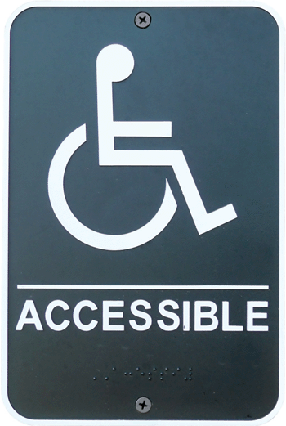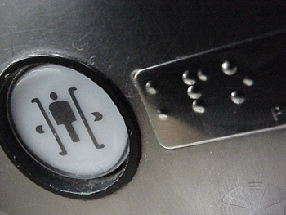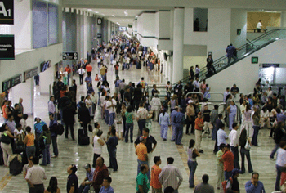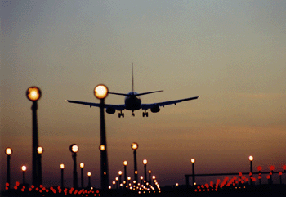Refusal of acceptance at the check-in or access on
board because of a disability; no or insufficient assistance in the
airport or on board; request for payment for assistance; degrading
treatment; mobility aids damaged or not refunded; air terminals without
audio information; lack of information material in alternative formats;
inaccessible Web sites; scarce or no preparation of staff, or
impoliteness during security controls; discrimination on board of
airplanes.
These are the most frequent complaints from travellers with
disabilities on air routes in Europe. The increasing competition following
the opening of the market to ever new airline companies, more or less
aggressive, has provided certain advantages, like reduced fares, but more
often than not it resulted in less quality of services and often more
direct or indirect discrimination towards persons with disabilities. There
has even been the introduction of "fees" which arbitrarily limit the
number of persons with disabilities allowed to travel on the same
airplane. Some companies require from persons with disabilities payment
for assistance services they receive.
This does not mean that there is
no correct or virtuous behaviour (good service, good treatment, equal
treatment with other passengers, respect for the dignity of passengers
with disabilities during assistance), but all this has been done thanks to
the good will of airport services and airline companies.
But there
now is, at the European level, a precise regulation that all State
Members must respect. In the month of July 2008, will come into full force
the regulation passed by the European Union to ensure the rights of
passengers with reduced mobility (the so-called PRM) and of persons with
disabilities in the air transportation field.
With much difficulty,
because of the reluctance from the entrepreneurial lobby, organizations
representing persons with disabilities and consumers have succeeded in
gaining a set of rules that protect the rights of travellers with specific
requirements.
In 2004, a public regulation
had sanctioned the rights of passengers, establishing measures of
guarantee and compensation in case of inefficiency, such as delays or
cancellations of flights not due by force majeure, or in cases
where the airplane company had overbooked seats. In such circumstances,
plane tickets were reimbursed, or money compensations were provided or
free hotel rooms. To persons with disabilities and their assistants
priority was given or rebooking on another flight. Such regulation set
equal rights for all travellers, but did not take into account the
specific requirements of certain type of passengers among which are
persons with disabilities.
So, in 2005, the European Commission
presented a regulations proposal on the rights of persons with reduced mobility and with disabilities in
the air transportation field.


This was the first proposal for a specific legislation
relating to disability at the European level, applicable directly to
airports and airlines. This regulation was approved by the European
Council of Ministers in June 2006.
This set some basic principles among
which:
- assistance should be financed in such a way as to spread the
burden equitably over all passengers;
- persons with disabilities and
persons with reduced mobility should not be refused transport on the
grounds of their disability or lack of mobility;
- assistance to meet
their particular needs should be provided at the airport as well as
on-board aircraft, and until the exit of the airport of destination
without additional charge;
- assistance services are primordial in
airports and these have to provide such services to all companies stoping
over;
- staff providing assistance to disabled travellers should have
regard to a code of good conduct and be prepared to respond to their
requirements;
- standards and regulations for the quality of assistance
have to be defined by law;
- the possibility to present claims to
competent organizations has to be guaranteed and established at the
national level;
- airlines are responsible for the assistance they
offer on board;
- airline companies can refuse transport only for
safety reasons prescribed by law, possibly at the European level, and
justified, providing the interested passenger with the complete
information. Moreover, in the evaluation of security situations, the
airlines' internal regulations do not prevail.
From what is written
above, it seems clear that all persons who have a physical, sensory,
intellectual or motor disability, who is older or
requiring special attention, have the right to the adaptation of services
provided to all passengers according to their needs. In fact, the
regulation will ensure disabled travellers
the possibility to travel in conditions that are as
similar as possible as those of other passengers, during all phases of the
air travel and carring all necessary aids in order to overcome the
disability. In cases such special aids are damaged or lost, compensation
is guaranteed.
Within this positive framework, there are unfortunately
two wrong notes that could have and should have been avoided. From one
side, airline companies have an unjustified discretion, where on the
grounds of security, they can request that a person with disabilities be
accompanied and, if it is not the case, refuse to accept that person. On
the other side, it was established that a passenger needing assistance has
to notify the airline 48 hours before the purchase of the ticket. In the
first case, it would have been better to let the passenger decide whether
or not he or she wants to be accompanied, while it is understood that
sometimes the accompanying person may be essential even in the interest of
the disabled person. In the second case, it was made clear that even if
the 48-hour limit is not respected, the airport organization has to carry
out every reasonable effort to provide assistance to the disabled
passenger. We have however reasons to believe that such cases are highly
infrequent.
As mentioned above, the provision will come into force on
July 7, 2008, but right from July 7, 2007, airline companies will not be
able to refuse on board disabled people. The European Disability Forum was
entrusted by ECAC (European Conference on Civil Aviation) to develop
guidelines informing airport and airline staff on the special and
different needs of persons with disabilities, and to make suggestions for
the training of such personnel.
Finally, the regulation will provide
the obligation to consult organizations representing persons with
disabilities and to include them in committees where consumers have to be
represented in airports.
These organizations will have to be consulted
also on the development of quality standards for the services
provided.
It seems particulary important that the regulation should not
be ratified by the State Members, but that it will come automatically into
force. The States will have to establish an organization responsible for
the implementation of the regulation, set sanctions when it is not
respected, and determine precise procedures for the management of claims
of which users will have to be adequately informed.

